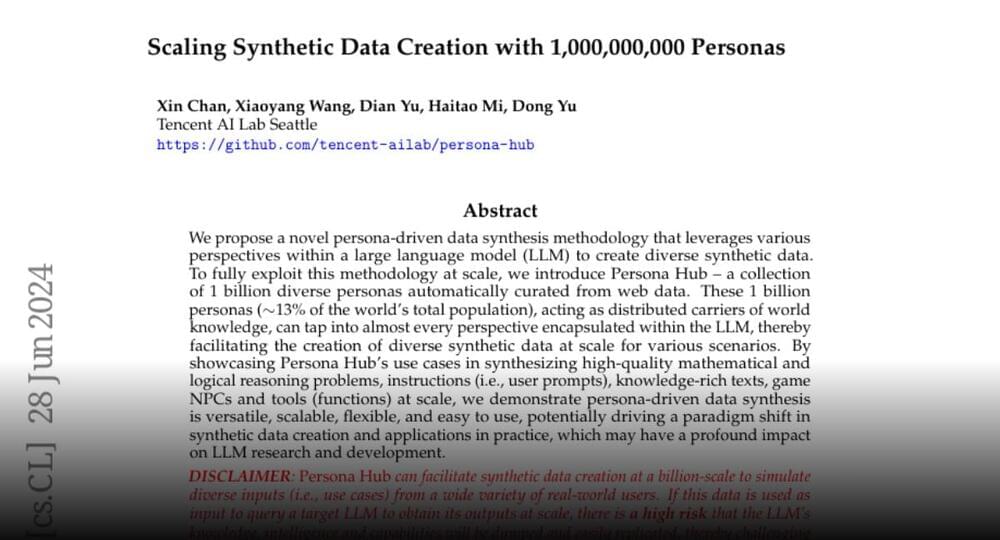Brighter with Herbert.
Month: July 2024 – Page 146

Chinese neural probe could be ‘transformative’ advance for brain-computer links
The probe also achieved stable neural recordings in rat brains for up to two years, showing excellent biocompatibility and long-term recording stability, state news agency Xinhua reported.
Cheng Heping, with the Chinese Academy of Sciences and director of the National Centre for Biomedical Imaging Science at Peking University, told Xinhua that the achievement provided a powerful tool for high-throughput simultaneous monitoring of activity in multiple brain regions, and for exploring the relationships between neural activity and behaviour.

Scaling Synthetic Data Creation with 1,000,000,000 Personas
Xin Chan, Xiaoyang Wang, Dian Yu, Haitao Mi, Dong Yu Tencent AI Lab Science June 2024 https://huggingface.co/papers/2406.
We propose a novel persona-driven data synthesis methodology that leverages various perspectives within a…
Join the discussion on this paper page.
The Enzyme Leading the Charge Against Tumor metastasis
This study uncoversthe pivotal role of the enzyme METTL4 in promoting tumor metastasis through the mediation of nuclear N6-methyldeoxyadenosine (6mA) in mammalian cells. By utilizing cellular models, the study demonstrates how hypoxia induces METTL4 to mediate 6mA modifications. This process, in turn, activates genes essential for tumor metastasis, including the involvement of specific long noncoding RNA and a novel HIF-1α co-activator, ZMIZ1. These findings not only shed light on the epigenetic mechanisms driving tumor progression but also establish METTL4 as a prognostic marker for cancer and a potential target for therapeutic intervention. The promise of this discovery lies in its potential to inspire new strategies for combating hypoxia-induced tumor progression, opening avenues for further research and development in cancer treatment.
DNA N6-methyldeoxyadenosine (6mA) has been recognized in various organisms for its role in gene regulation. However, its function in mammalian cells, particularly in the context of cancer, has remained elusive. Previous studies have shown that 6mA modifications can influence gene expression and are present in several species, indicating a potential regulatory role in tumorigenesis. This research addresses a critical gap in understanding the nuclear role of 6mA and its enzymatic mediator METTL4, in mammalian tumor cells, particularly under hypoxia (a common condition in tumor microenvironments that promotes metastasis). The study posits that METTL4-mediated 6mA deposition is a key epigenetic modification that activates metastasis-inducing genes. This finding offers a new perspective on the mechanisms of tumor progression and identifying novel targets for therapeutic intervention.
According to recent World Health Organization statistics, cancer remains a leading cause of death globally, with metastatic cancers posing significant treatment challenges. This study’s revelations underscore the urgent need for novel therapeutic strategies to address the complex mechanisms of cancer metastasis. By linking the research findings to SDG 3, which aims to ensure healthy lives and promote well-being for all, the study highlights the potential for significant advancements in cancer treatment. Ultimately, the study paves the way for improved health outcomes and underscores the importance of continued investment in research and development to combat the global cancer burden.
Cure for cancer? Israeli scientists say they may have found one
Is it possible that a cure for cancer will be available in one year’s time? A team of Israeli scientists believes so.